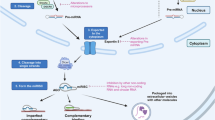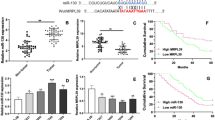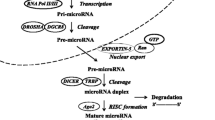Abstract
Purpose
One of the most common cancers in the world is colorectal cancer, which has increased significantly in recent decades. In the carcinogenicity process in the colon, there are genes involved in various cellular processes, such as cell cycle, apoptosis, and cell migration. According to studies carried out, both miR-506 and SPON 1 genes are involved in the process which initiates and promotes cancer. In this study, alterations in the expression of target genes from the viewpoint of carcinogenicity were studied and evaluated.
Methods
Fifty tumor tissues and normal marginal tissue were collected from patients who were undergoing colorectal cancer surgery. After the extraction of RNA, the real-time PCR method was performed to evaluate the gene expression. Also, alterations of gene expression in response to defined amounts of chemotherapeutic drugs (IC50) were evaluated. P < 0.05 was considered statistically significant.
Results
The relative expression level of miR-506 in tumor tissues was significantly decreased in comparison with healthy marginal tissues (P = 0.044). On the other hand, the SPON1 gene expression level was decreased too in tumor tissues in comparison with healthy marginal tissues (P = 0.019). There was also a significant relationship between the expression of target genes and clinicopathological involvement. However, there was no significant alteration in these genes along with the chemotherapeutic drug.
Conclusion
These findings suggest that the relative expression of miR-506 and SPON 1 gene can be considered as a diagnostic or predictive biomarker for colorectal cancer. However, further studies on protein levels should be conducted.


Similar content being viewed by others
References
Kuipers EJ, et al. Colorectal cancer. Nat Rev Dis Primers. 2015;1:15065.
Lee IM, Shiroma EJ, Lobelo F, Puska P, Blair SN, Katzmarzyk PT, et al. Effect of physical inactivity on major non-communicable diseases worldwide: an analysis of burden of disease and life expectancy. Lancet. 2012;380(9838):219–29.
Morris EJ, Penegar S, Whitehouse LE, Quirke P, Finan P, Bishop DT, et al. A retrospective observational study of the relationship between family history and survival from colorectal cancer. Br J Cancer. 2013;108(7):1502–7.
Hampel H, Frankel WL, Martin E, Arnold M, Khanduja K, Kuebler P, et al. Feasibility of screening for Lynch syndrome among patients with colorectal cancer. J Clin Oncol. 2008;26(35):5783–8.
Cunningham D, Atkin W, Lenz HJ, Lynch HT, Minsky B, Nordlinger B, et al. Colorectal cancer. Lancet. 2010;375(9719):1030–47.
Shomali, N., et al., Downregulation of miR-146a promotes cell migration in Helicobacter pylori-negative gastric cancer. 2019. 120(6): p. 9495–9505.
Shirafkan N, Mansoori B, Mohammadi A, Shomali N, Ghasbi M, Baradaran B. MicroRNAs as novel biomarkers for colorectal cancer: new outlooks. Biomed Pharmacother. 2018;97:1319–30.
Ghasabi M. et al. MicroRNAs in cancer drug resistance: basic evidence and clinical applications. 2019;234(3):2152–68.
Fadaka AO, Pretorius A, Klein A. Biomarkers for stratification in colorectal cancer: MicroRNAs. Cancer Control. 2019;26(1):1073274819862784.
Chen B, Xia Z, Deng YN, Yang Y, Zhang P, Zhu H, et al. Emerging microRNA biomarkers for colorectal cancer diagnosis and prognosis. Open Biol. 2019;9(1):180212.
Dong Y, Yu J, Ng SS. MicroRNA dysregulation as a prognostic biomarker in colorectal cancer. Cancer Manag Res. 2014;6:405–22.
Chen Z, et al. miR-124 and miR-506 inhibit colorectal cancer progression by targeting DNMT3B and DNMT1. Oncotarget. 2015;6(35):38139–50.
Li J, Ju J, Ni B, Wang H. The emerging role of miR-506 in cancer. Oncotarget. 2016;7(38):62778–88.
Tong JL, Zhang CP, Nie F, Xu XT, Zhu MM, Xiao SD, et al. MicroRNA 506 regulates expression of PPAR alpha in hydroxycamptothecin-resistant human colon cancer cells. FEBS Lett. 2011;585(22):3560–8.
Chang H, et al. Spondin 1 promotes metastatic progression through Fak and Src dependent pathway in human osteosarcoma. Biochem Biophys Res Commun. 2015;464(1):45–50.
Dai W, Huang HL, Hu M, Wang SJ, He HJ, Chen NP, et al. microRNA-506 regulates proliferation, migration and invasion in hepatocellular carcinoma by targeting F-spondin 1 (SPON1). Am J Cancer Res. 2015;5(9):2697–707.
Akbari M, et al. CD133: an emerging prognostic factor and therapeutic target in colorectal cancer. Cell Biol Int. 2019.
Karimi, L., et al., miRNA-143 replacement therapy harnesses the proliferation and migration of colorectal cancer cells in vitro. 2019. 234(11): p. 21359–21368.
Shanehbandi, D.
Noorolyai, S., et al., The role of microRNAs involved in PI3-kinase signaling pathway in colorectal cancer. 2019. 234(5): p. 5664–5673.
Vasile L, Olaru A, Munteanu M, Pleşea IE, Surlin V, Tudoraşcu C. Prognosis of colorectal cancer: clinical, pathological and therapeutic correlation. Romanian J Morphol Embryol. 2012;53(2):383–91.
Jia Y, Guo M. Epigenetic changes in colorectal cancer. Chin J Cancer. 2013;32(1):21–30.
Kondo Y, Issa JP. Epigenetic changes in colorectal cancer. Cancer Metastasis Rev. 2004;23(1–2):29–39.
Wang F, Ma Y, Wang H, Qin H. Reciprocal regulation between microRNAs and epigenetic machinery in colorectal cancer. Oncol Lett. 2017;13(3):1048–57.
Lu Z, Zhang W, Gao S, Jiang Q, Xiao Z, Ye L, et al. MiR-506 suppresses liver cancer angiogenesis through targeting sphingosine kinase 1 (SPHK1) mRNA. Biochem Biophys Res Commun. 2015;468(1–2):8–13.
Banales JM, Sáez E, Uriz M, Sarvide S, Urribarri AD, Splinter P, et al. Up-regulation of microRNA 506 leads to decreased Cl-/HCO3- anion exchanger 2 expression in biliary epithelium of patients with primary biliary cirrhosis. Hepatology. 2012;56(2):687–97.
Coulouarn C, Factor VM, Andersen JB, Durkin ME, Thorgeirsson SS. Loss of miR-122 expression in liver cancer correlates with suppression of the hepatic phenotype and gain of metastatic properties. Oncogene. 2009;28(40):3526–36.
Ben Mousa A. Sorafenib in the treatment of advanced hepatocellular carcinoma. Saudi J Gastroenterol. 2008;14(1):40–2.
Xu X, Tao Y, Shan L, Chen R, Jiang H, Qian Z, et al. The role of microRNAs in hepatocellular carcinoma. J Cancer. 2018;9(19):3557–69.
Acknowledgments
This study was carried out and supported at the Immunology Research Center, Tabriz University of Medical Science, Tabriz, Iran.
Author information
Authors and Affiliations
Corresponding author
Ethics declarations
Conflict of Interest
The authors declare that they have no conflict of interest.
Additional information
Publisher’s Note
Springer Nature remains neutral with regard to jurisdictional claims in published maps and institutional affiliations.
Rights and permissions
About this article
Cite this article
Tamjidifar, R., Akbari, M., Tarzi, S. et al. Prognostic and Diagnostic Values of miR-506 and SPON 1 in Colorectal Cancer with Clinicopathological Considerations. J Gastrointest Canc 52, 125–129 (2021). https://doi.org/10.1007/s12029-019-00356-0
Published:
Issue Date:
DOI: https://doi.org/10.1007/s12029-019-00356-0




